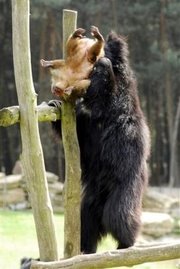 Fat Animals Are COOL!!!
Fat Animals Are COOL!!!CANBERRA (Reuters) - Australia is a nation of pet lovers but it may be loving its animals to death with pet owners passing on rising levels of obesity by overfeeding their cats and dogs, the country's main animal welfare body says.
Despite its image as a sports-mad country full of fit, sun-bronzed youth, Australia in reality is battling the bulge and challenging the United States as the world's fattest nation. The problem now extends to household pets.
Obesity rates for Australians have doubled over the past 20 years, with 62 percent of men and 45 percent of women now deemed overweight or obese.
The same trend applies to household pets, with an increase in the number of overweight cats and dogs being dealt with by the Royal Society for the Prevention of Cruelty to Animals (RSPCA), and even one case of an obese pet mouse.
"It's a big problem, and quite reflective of what's happening in the human situation," said Mark Lawrie, the RSPCA's chief vet.
Australia is a nation of 20 million people, almost 4 million dogs, 2.5 million cats, 8.7 million pet birds and more than 12 million pet fish.
It has one of the world's highest rates of pet ownership at 64 percent of households, compared to 62 percent in the United States and 44 percent in Britain.
Lawrie told Reuters surveys had found that between 40 and 44 percent of dogs and more than one in three household cats were now overweight, due to poor diet and a lack of exercise.
Fat cats and dogs were more vulnerable to diabetes, arthritis, heart problems and liver disease.
Dogs most at risk were Labradors, Beagles and cross-breeds such as Labradoodles -- a mixture of a Labrador and a Poodle -- with household moggies more at risk than other types of cats.
The RSPCA said de-sexing and lower levels of exercise had an impact on pet obesity, but the key issue was over-eating.
"It's really the calorie intake and food that makes the big difference," Lawrie said, adding that many pet owners could not resist giving their animals food when they asked for it.
